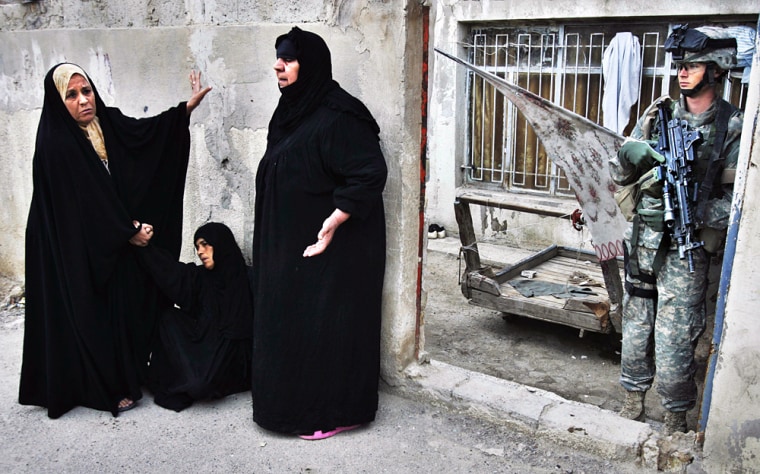American soldiers have again hit the streets of dangerous neighborhoods in western Baghdad that had been handed over to Iraqi forces, trying to keep a lid on sectarian attacks that have raged since the February bombing of a Shiite shrine in Samarra.
The U.S. military has refocused its mission to confront death squads that have tortured and killed hundreds, a tacit acknowledgment that Iraqi troops have not been able to control violence between Shiites and Sunnis on their own.
“Iraqi security forces can control large acts, but you can’t be everywhere at once. It’s like serious crime in the U.S. How do you prevent someone in Houston from going into someone’s house?” said Capt. Matt Brown of Eau Claire, Wis.
Fewer attacks are now directed against Americans, soldiers say. At the same time, the number of Iraqis found slain, apparently in tit-for-tat killings by Shiite and Sunni extremists, has sharply increased in western neighborhoods like Shula and Ghazaliyah.
A testy relationship
The return of more U.S. forces to the area just over a month after they left has tested relationships with Iraqi soldiers, however.
“To be perfectly honest, they were a little (angry) that we came back into their sector,” said 1st Lt. John Ford of Houston. “It’s getting to a point where they don’t want or need us. It’s unfortunate because we have a lot of assets to bring to the table.”
After an initial few days of tension, life appears to have pressed on as normally as possible in these areas, soldiers say. Shops are open and pedestrians crowd market streets — but bodies have also steadily appeared during their patrols.
“It’s random. You’ll see them on major roads and on alleys,” Brown said of the some 30 bodies that his unit has found. On March 8, 18 strangled men were found stuffed inside an abandoned minibus in a nearby neighborhood.
Since early March, Brown and soldiers from the 1st Squadron, 71st Cavalry have conducted daily foot and vehicle patrols that usually last 12 hours per day.
“It’s not that our combat power is necessary. It’s just adding to the perception of security. It puts the people at ease,” Brown said.
Soldiers express doubts
Other soldiers expressed doubts that the bolstered U.S. presence could contain the recent surge of violence.
“I think we’re reaching the point of diminishing returns on U.S. patrols in our area,” said 1st Lt. Paul Tanghe of Minneapolis. “It’s not going to stop until the people in that house, that house, and that one want it to stop. ... You definitely get the sense that there are some people who don’t want it to stop.”
A dull thud was heard in the distance as Tanghe spoke during the patrol Friday through Shula, where support is strong for Shiite militiamen loyal to hardline cleric Muqtada al-Sadr.
Minutes later, Tanghe’s troops heard that suicide bombers had attacked a nearby Shiite mosque. Iraqi officials later said 85 people were killed.
‘A cultural thing’
Whatever limitations the U.S. troops have in controlling the violence, they expressed concern that Iraqi troops were still not up to the task. Some said Iraqi soldiers tend to cluster around checkpoints rather than walking regular beats through neighborhoods.
“I think it’s a cultural thing, whereas we’re used to working 8-10 hours a day ... they’re used to working 4-5 hours per day,” Ford said.
Earlier this year, areas of western Baghdad were testament to the U.S. strategy of handing over security responsibility. Iraqi soldiers manned checkpoints while American troops carefully kept their distance.
The shift in U.S. strategy is temporary, a result of sectarian attacks unleashed by the Feb. 22 bombing of a major Shiite shrine in Samarra, 60 miles north of the capital.
Eventually, U.S. troops said they expected to return to support missions, leaving Iraqi troops in charge once again.
Recalling another civil war
But some were not assured that the situation would improve. Tanghe likened the situation to the strife between pro- and anti-slavery forces in Kansas and western Missouri before the outbreak of the Civil War in 1861.
“I think a more appropriate analogy might be ‘Bleeding Kansas,’ where there is a general atmosphere of lawlessness where anything goes and everybody is free to act on any impulse they may have, unless you happen to be in the presence of American or Iraqi security forces,” Tanghe said.
“It’s going to be violent once we leave. Once we hand it over to the Iraqi security forces, (insurgents) are going to test them. It’s going to be bloody,” Tanghe said.
